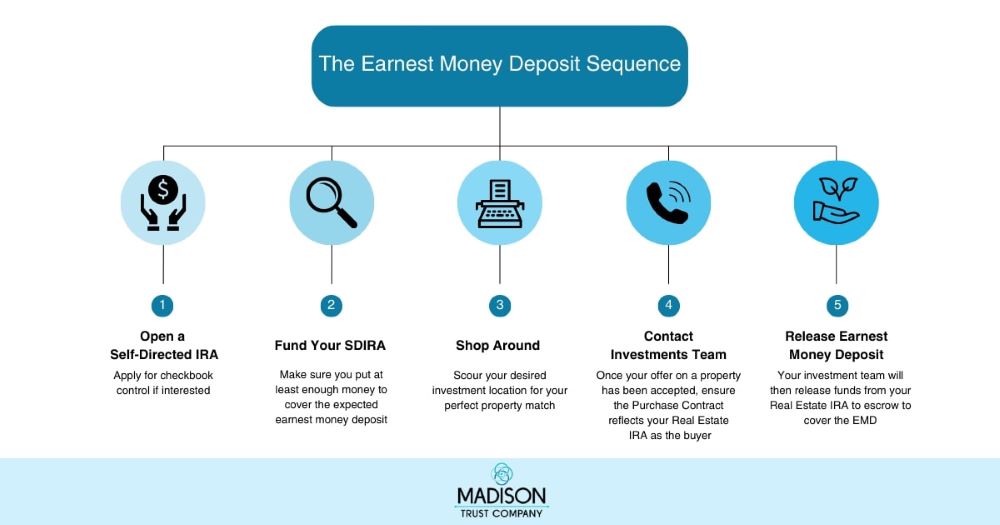Common Missteps of Real Estate IRA Investing and How You Can Avoid Them
Written By: Daniel Gleich
Key Points
- Purchasing real estate is incredibly fast-paced and time sensitive. Protect your Self-Directed IRA (SDIRA) by insuring you’re properly vesting the title.
- When placing an offer on a property, you should never use personal funds to cover an earnest money deposit.
- It’s important to note you cannot personally benefit somehow from your real estate investment.

A Real Estate IRA or Self-Directed IRA (SDIRA) is another name for a retirement account nearly tailor-made for real estate investments. Its ingenuity grants investors the chance to potentially profit from property ownership, all while saving and preparing for retirement. Real estate has been a hot commodity over the last few years because of its typical appreciation. Jumping on a possible lucrative property can be exciting, but like with any important decision, you shouldn’t throw caution to the wind.
Let’s look at some common missteps individuals can make when investing with a Real Estate IRA and how you can avoid them.
It's Not You, It's Your Real Estate IRA

Even though you are the account holder of your Real Estate IRA, you as an individual entity cannot claim ownership over a residency your IRA has purchased. Improperly titling your real estate investment under your personal name could appear as though you are benefiting from the residence. This could result in a prohibited transaction.
Here’s an example of how your property title should read, when purchasing with a Real Estate IRA:
“Madison Trust Company, FBO Jane Doe, Traditional IRA 112233”
If you’ve completed the contract and vested the title under your name, it’s imperative that you resolve this quickly. To do so, create an entirely new contract. You may face trouble if you make an earnest money deposit with an incorrectly vested title, so avoid continuing until the paperwork is rectified.
Earnest Money Education
For those in the beginning stages of investing, earnest money deposit may not be a familiar term. Essentially, an earnest money deposit (EMD) is a deposit made in good faith. By putting down a bulk of money, you’re demonstrating your serious pursuit in owning the respective property. In addition, this grants the seller peace of mind as a buyer who submits an EMD is less likely to lose interest.
You bring this money to the table during the signing of the sales contract, or purchase agreement. Some investors also use the earnest money deposit as a tool when presenting their offer. Usually, the amount of an earnest money deposit ranges from one to five percent of the sale price during the time of deposit.
Typically, the more money you’re willing to put down, the more intrigued the seller may be by your offer. You may want to consider this while crunching numbers and determining what you’re able to deposit.

The Principles of Earnest Payment in a Real Estate IRA

Generally, once you’ve decided to purchase real estate, your earnest money deposit would be sent to an escrow account. These funds would then stay in escrow until you officially closed on the property. During this process, some investors write a personal check for their earnest money deposit. Following, they then attempt to have their Real Estate IRA purchase the respective property. In this case, using a personal check for an EMD and then purchasing the property through your IRA would result in a prohibited transaction.
Investments made through a Real Estate IRA require all expenses and profits to flow through the account. Having any form of payment made by means outside of the IRA could potentially compromise the validity of the account. This includes the earnest money deposit. Here are the proper steps to making an earnest money deposit payment:

Real Estate IRA Resolution
If you’ve made the mistake of paying your earnest money deposit with personal funds, you can attempt to rescind the earnest money deposit. Resubmit said EMD through your Real Estate IRA. If escrow has already opened, the title company may need to open a new escrow to reimburse your original EMD payment.
Utilizing best practice, one should proceed with diligence and review all documentation with a fine-tooth comb and consult a financial advisor when applicable.

Speed Up and Simplify
To make the process of paying your earnest money deposit even easier, consider upgrading your Real Estate IRA by adding checkbook control. This supercharged tool gives your IRA the ability to perform everyday transactions without the involvement of a custodian. This indicates that you’re capable of investing and purchasing in real time, allowing you to seize any sudden opportunities. As the uncompensated manager and sole participant of your account, putting down your earnest money deposit is seamless through a checkbook control powered vehicle.
Invest Today to Enhance Your Tomorrow

Real Estate IRAs are designed to potentially accumulate revenue over time, aiding in your retirement savings. Given the tax-advantaged growth that typically ensues, the Real Estate IRA is an esteemed saving method. These are meant to benefit the account holder in retirement, not in the present day.
To ensure you’re using your Real Estate IRA properly, consider speaking with a Self-Directed IRA Specialist or your financial advisor.
Real Estate IRAs: Structured to be Simple
Real Estate IRAs are constructed to be easily understood retirement savings mechanisms. Many investors have seen successes through these investment ventures. Attainment can potentially be yours, so long as you take note of the Real Estate IRA rules, the earnest money deposit sequence, and prohibited transactions.
Now Seeking: Possible Real Estate Tycoons
Madison Trust’s Self-Directed IRA Specialists revel in helping clients along the self-directed journey. If you’re fascinated by real estate investing and would like to learn more about establishing a Real Estate IRA, reach out to Madison Trust today and prepare for property power!










